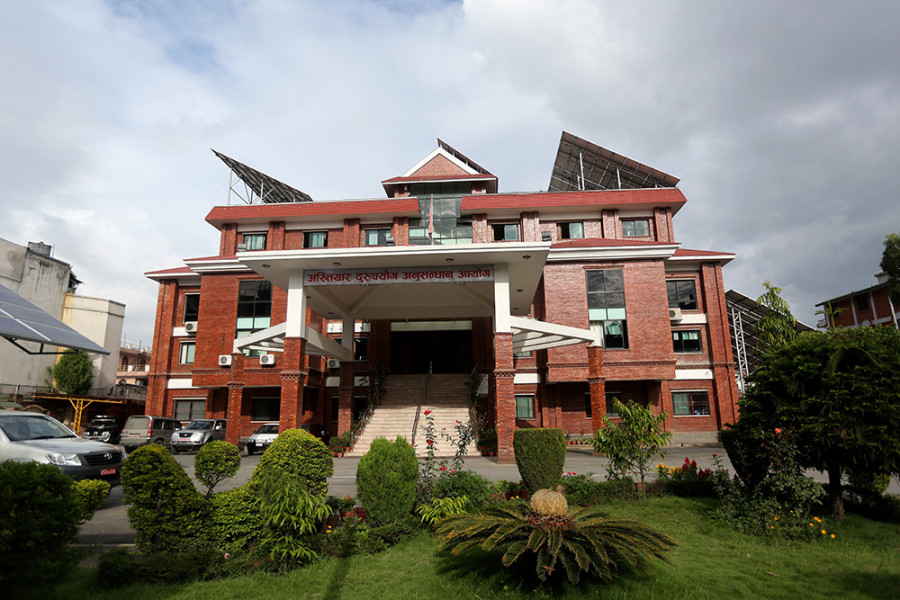Politics
A decision that benefits a few individuals cannot be a policy decision, judges and lawyers say
The anti-graft body had let off two former prime ministers on corruption charges citing ‘policy decisions’, which many say the Lalita Niwas decisions are clearly not.
Prithivi Man Shrestha
The anti-graft agency has said that investigations into the Cabinet’s policy decisions are beyond its jurisdiction, citing law. The commission has presented two grounds—a verdict of the Special Bench of the Supreme Court on September 24, 1996 regarding what constitutes policy decisions, and Section 4 (B) of the Commission for Investigation of Abuse of Authority Act.
The Commission Act bars investigation into policy decisions of the Cabinet and Cabinet committees while the Supreme Court verdict says decisions taken “collectively” by the Cabinet to fulfil promises made in the election manifesto constitute ‘policy decisions.’
Bal Krishna Neupane, a senior lawyer, based on whose writ the Supreme Court had passed the verdict more than two decades ago, said that he will once again move the court over the commission’s assessment of policy decisions while exonerating two former prime ministers.
The commission, which filed corruption charges against 175 individuals, including three former ministers, in relation to the Lalita Niwas land grab, last week has exempted Madhav Kumar Nepal and Baburam Bhattarai, saying their Cabinet decisions were “policy decisions”.
Neupane said that he is approaching the court because the anti-graft agency has wrongly interpreted the court verdict which is exactly opposite of what the court defined.
According to Neupane, the court verdict has clearly defined policy decisions as those decisions which are taken in line with the political parties’ election manifesto.
“The commission has misconstrued the Supreme Court verdict,” Neupane told the Post. “Did Baburam Bhattarai, while standing as a candidate for elections, announce in his election manifesto that he would cause losses to the government by distributing the land of Lalita Niwas to fake tenants?”
The 1996 verdict was issued by then chief justice Surendra Prasad Singh and justices Keshav Prasad Upadhyaya, Laxman Prasad Aryal, Kedar Nath Upadhyay and Udayaraj Upadhyaya.
Justice Aryal had written a dissenting opinion on the verdict, saying that according to Article 98 (1) of the 1990 Constitution of Nepal, no Cabinet decision should be exempted from the purview of the anti-graft body.
“So the prohibitory Section 4 Subsection B of the Commission for Investigation of Abuse of Authority Act automatically stands invalid,” Aryal had written.
Section 4 (B) of the act states, “The Commission, pursuant to the Act, shall not take any action in matters relating to any business or decisions taken at meetings of any House of Parliament or of any committee or anything said or done by any member at such meetings, or any policy decisions taken by the Council of Ministers or any committee thereof or judicial actions of a court of law.”
In its 2018-19 Annual Report, the commission has asked the government to define “policy decision” and clarify the borderline between “policy decisions” and “administrative decisions.”
According to Neupane, despite the commission itself asking that the term be clarified, it has taken the liberty to call the decisions taken by the Nepal- and Bhattarai-led Cabinets as “policy decisions”. There is clearly a malafide intention in doing that, he said.
According to Khem Raj Regmi, president of Transparency International Nepal, an anti-corruption watchdog, the anti-graft body appears to have failed to use its authority to invoke the Supreme Court verdict or work in line with the verdict.
As per the Supreme Court verdict, the law does not prevent the commission from investigating any “policy decision” of the Cabinet or its committee, except for “collective policy decisions”. Likewise, the law also does not prevent the commission from investigating any departmental policy adopted by any minister, any minister-level decision, or any discrimination, carelessless, ignorance, delay and non-performance from a Cabinet member.
But for the commission to act against politicians, it needs strong backing from political forces, said Regmi.
Anti-corruption activists say that political will is a big ask in a country like Nepal, where officials at the commission are appointed on the basis of political power sharing.
“This is probably one reason why the anti-graft body has failed to invoke its authority,” said Regmi.
Legal analysts and former bureaucrats say that not much discussion is required on what constitutes a policy decision if the intentions are right.
Advocate Bhimarjun Acharya said that accepting bribes and transferring government properties to individuals do not qualify as “policy decisions”.
“They are simply ‘decisions’ taken in the interest of certain individuals or firms,” Acharya told the Post last week.
Among the 175 people indicted for illegally grabbing land in a prime location in Baluwatar, known as Lalita Niwas, three are former ministers and as many are secretaries, who were involved in preparing the proposals and taking them to the Cabinet.
“Unlike in the judiciary or Parliament, nowhere in the world can the executive get immunity for decisions, except on issues of national security,” said Balram KC, a former Supreme Court justice. “The anti-graft agency cannot examine whether the decision of the Cabinet is right or wrong, but it can obviously question if the decision is related to corruption.”
Citing Article 239 (1) of the 2015 Constitution of Nepal, KC said that an Act cannot be above a constitutional provision and it cannot contradict any constitutional provision.
Article 239 (1) of the constitution, under the heading ‘Functions, duties and powers of Commission for Investigation of Abuse of Authority’, states: “The Commission for Investigation of Abuse of Authority may, in accordance with law, conduct, or cause to be conducted, investigations of any abuse of authority committed through corruption by any person holding public office.”
According to Gauri Bahadur Karki, former chairperson of the Special Court, only those decisions which are for the larger good of the public are policy decisions.
“For example, a decision to support the victims of natural calamities like earthquake, landslides and floods, a decision to accept goods from foreign countries in situations like blockade and a decision to bring Nepalis back from coronavirus-hit China and necessary preparations and expenditures for the same qualify as policy decisions,” said Karki.
Karki pointed out that in the case of the Lalita Niwas scandal, despite the law authorising the Department of Land Reforms to decide on tenants, the Cabinet took decisions.
“Even Parliament cannot snatch away the rights of government officials authorised to take decisions without amending the law,” he said.
Former chief secretary Bimal Koirala echoed Karki.
“A policy decision deals with the larger public interest; decisions that are related to a few individuals or events do not qualify as policy decisions,” said Koirala.
While Koirala refrained from commenting on whether the commission’s decision was right or wrong, he did mention that without a go-ahead from the prime minister, the chief secretary cannot write any decision.
“In the system that we practice, the buck stops with the prime minister,” he said.
Tika R Pradhan contributed reporting.




 14.24°C Kathmandu
14.24°C Kathmandu














